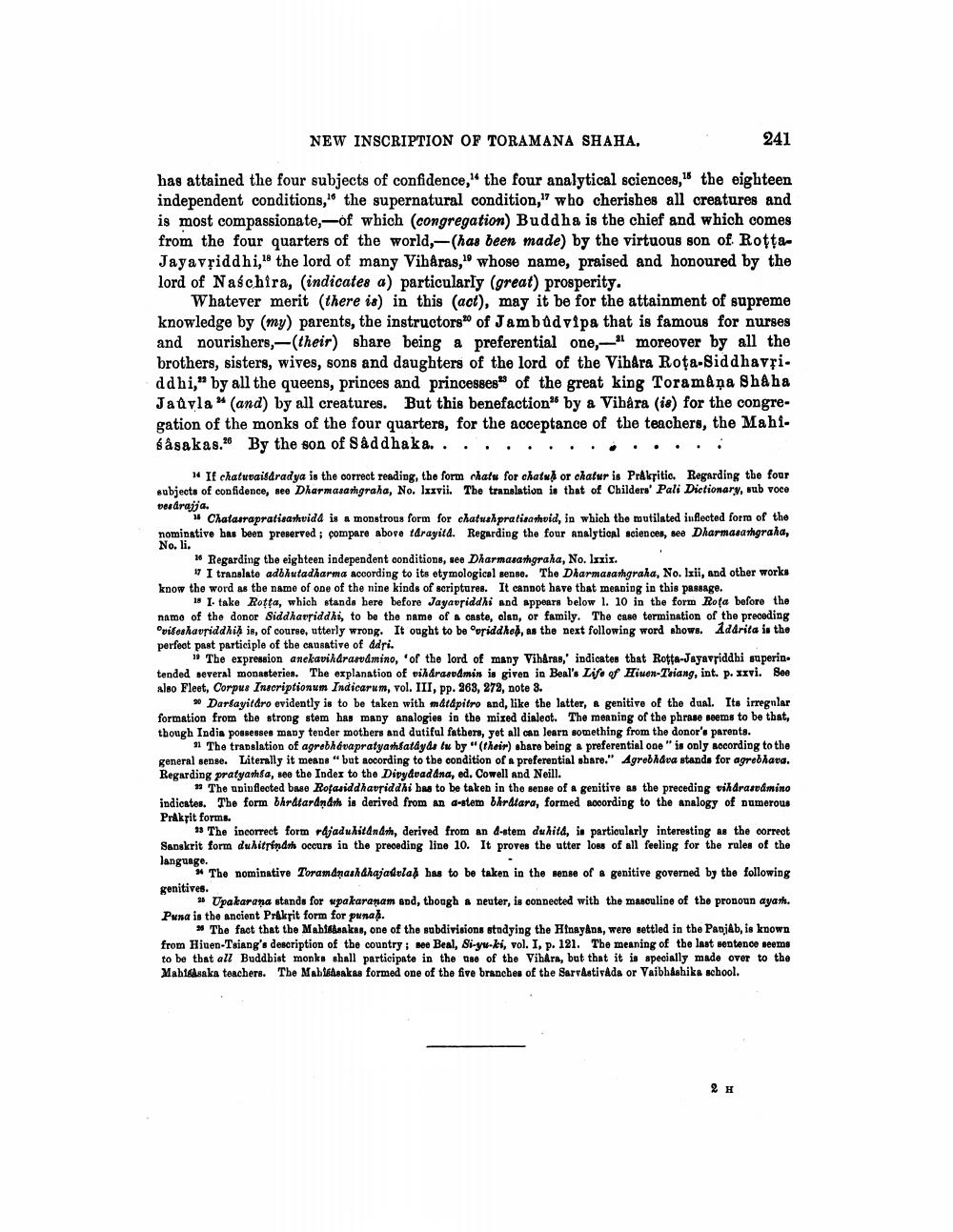________________
NEW INSCRIPTION OF TORAMANA SHAHA.
241
bas attained the four subjects of confidence, the four analytical sciences, the eighteen independent conditions, the supernatural condition, who cherishes all creatures and is most compassionate-of which (congregation) Buddha is the chief and which comes from the four quarters of the world,-(has been made by the virtuous son of. RottaJayavriddhi, the lord of many Vihåras, whose name, praised and honoured by the lord of Naschira, (indicates a) particularly (great) prosperity.
Whatever merit (there is) in this (act), may it be for the attainment of supreme knowledge by (my) parents, the instructors of Jambad vipa that is famous for nurses and nourishers, -(their) share being a preferential one,- moreover by all the brothers, sisters, wives, sons and daughters of the lord of the Vihara Roța-Siddhavsi. ddhi," by all the queens, princes and princesses of the great king Toramaņa Shaha Ja llvla(and) by all creatures. But this benefaction" by a Vihara (is) for the congregation of the monks of the four quarters, for the acceptance of the teachers, the Mahi. basakas. By the son of Saddhaka.......... . . . . .
If chatuvaisdradya is the correct reading, the form chatu for chatud or chatur is Prakritio. Regarding the four subjects of confidence, see Dharmasargraha, No. lxxvii. The translation is that of Childers' Pali Dictionary, sub voce vesdrajja.
Chatasrapratisarkvidd is a monstrous form for chatushpraticamvid, in which the mutilated inflected form of the nominative has been preserved ; compare above tarayitd. Regarding the four analytical sciences, see Dharmasangraha, No. li.
* Regarding the eighteen independent conditions, see Dharmasangraha, No. lxxix.
1 I translate adbhutadharma according to its etymological sense. The Dharmasangraha, No. Izii, and other works know the word as the name of one of the nine kinds of scriptures. It cannot have that meaning in this passage.
18 1. take Rotta, which stands here before Jayavsiddhi and appears below 1. 10 in the form Rota before the name of the donor Siddhavsiddhi, to be the name of a caste, olen, or family. The case termination of the preceding Opifeshavsiddhiḥ is, of course, utterly wrong. It ought to be Cosiddhel, as the next following word shows. Addrita is the perfect past participle of the causative of adri.
The expression anekavihárasvamino, 'of the lord of many Viharas,' indicates that Rotts-Jayavriddhi superio. tended several monasteries. The explanation of vihärasvdmin is given in Beal's Life of Hiuen-Triang, int. p. xxvi. See albo Fleet, Corpus Inscriptionum Indicarum, vol. III, pp. 263, 272, note 3.
90 Darfayitdro evidently is to be taken with matapitro and, like the latter, & genitive of the dual. Its irregular formation from the strong stem has many analogies in the mixed dialect. The monning of the phrase seems to be that, though India possesses many tender mothers and dutiful fathers, yet all can learn something from the donor's parents.
91 The translation of agrebhavapratyamfatâys tu by "(their) share being a preferential one" is only according to the general sense. Literally it means "bat according to the condition of a preferential share." Agrebhava stands for agrebhava. Regarding pratyashsa, see the Index to the Diondoa
* The opinflected base Rofasiddhavsiddhi bas to be taken in the sense of a genitive as the preceding vihdrasvamino indicates. The form bhratardnath is derived from an a-stem bardlara, formed according to the analogy of numerous Prakrit forms.
13 The incorrect form rajaduhitandth, derived from an d-stem duhita, in particularly interesting as the correct Sanskrit form duhitrindh occurs in the preceding line 10. It proves the utter loss of all feeling for the rules of the language.
* The nominative Toramanashdhajadvlat has to be taken in the sense of a genitive governed by the following genitives.
* Upakarana stands for wpakaranam end, though a neuter, is connected with the masculine of the pronoun ayah. Puna is the ancient Prikrit form for punal.
The fact that the Mabiadakas, one of the subdivisions stadying the Hinay na, were settled in the Panjab, is known from Hinen-Tsiang's description of the country: see Beal, Si-yu-ki, vol. I, p. 121. The meaning of the last sentence seems to be that all Buddbist monks shall participate in the use of the Vihara, but that it is specially made over to the Mahifasaka teachers. The Mabiasakas formed one of the five branches of the Sarrastivada or Vaibhashika school.
2 H




